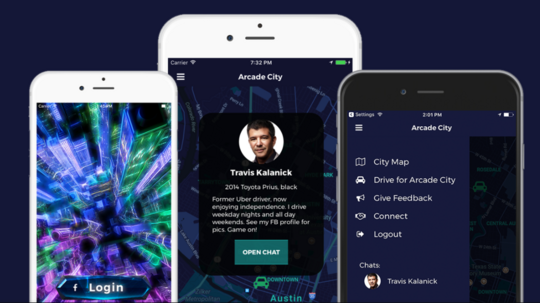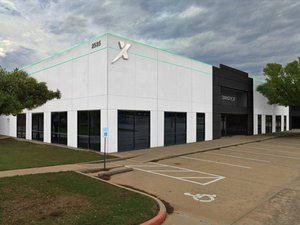
Arcade City may be one of the least-well known and most misunderstood ride-hailing startups in Austin -- and beyond.
It's not the same kind of middle man between riders and drivers that Uber, Lyft, Fasten and Ride Austin are. In fact, the company doesn't handle payments at all. It just connects someone wanting a ride with someone willing to drive.
Its app, for example, doesn't have a "request ride" button like most other ride-hailing apps. Instead, it shows a map of available drivers in your area and gives you an option to open a chat with them to discuss details of pick up and drop off. Drivers set their own rates, and it's largely up to them to develop a connection with riders for repeat business.
"Right now most transportation laws are outdated. Hopefully governments recognize this and are willing to work with us in updating their laws."
The startup ran into trouble last July when Austin police conducted a sting operation that led to fines and several Arcade City drivers' cars being impounded. Later, police entered Capital Factory, where the company had office space, with plans to ticket the company for operating without city approval.
That trend somewhat repeated itself this week when Arcade City launched in the Philippines shortly after news broke that the country had suspended Uber. The American startup's abrupt entry to the market was noted in a few news and tech publications.
Business Front Page August 17, 2017https://t.co/i1p5pkz6o7 pic.twitter.com/wDiz1Fi6rx
— The Manila Times (@TheManilaTimes) August 16, 2017
I thought this would be a good time to check in with Arcade City founder Christopher David, who is no stranger to controversy, to see how things are going from his perspective. The interview was conducted via email Wednesday and Thursday this week.
AI: It’s been a while since Austin Inno readers got an update on Arcade City. A little over a year ago, Austin Police were in Capital Factory looking for your team with plans to cite you for operating a transportation service without valid operating authority. What became of the legal issues in Austin and how has it impacted Arcade City and its riders/drivers?
CD: After the attempt to fine us last year, we met with transportation officials and explained why Arcade City is not a transportation network company. It's partly because our company does not take payments from riders or drivers and partly because anyone identifying as an Arcade City driver is an independent entrepreneur, not a contractor hired by Arcade City. So the city has left us alone for the past year, while our 150+ Austin drivers have continued providing reliable service month after month with no major issues. We’re proud to say that Arcade City Austin is the world’s first self-governing ridesharing network, operating day-to-day with a local leadership team and no interference by corporate headquarters. It’s a model we’re now expanding to other countries.
AI: We recently noticed your expansion to the Philippines. Why did you decide to start operating there and how did you do it being based so far away?
CD: Earlier this week the Philippine government ordered Uber to suspend service for one month, instantly putting 66,000 drivers out of a job and stranding tens of thousands of riders.
It’s a similar situation to what happened last year in Austin — and the perfect opening for Arcade City to showcase our decentralized model. Last year while Austin's Uber clone apps took a few weeks or months to get established, the flexible peer-to-peer model of Arcade allowed us to enter the market right away and help provide continuity of service in the hectic first weeks. This time we have a mobile app to make it easier for riders and drivers to connect with each other.
In the past 48 hours, we’ve signed up thousands of riders and hundreds of drivers. Riders can use our app to view profiles of nearby drivers and communicate with them directly to coordinate rides peer-to-peer. It’s not hard to launch an app to a hungry market: we start with a few Facebook ads and press releases, until word-of-mouth spreads it viral.
AI: It appears you ran into some issues there, as well. What happened in the Philippines and how is Arcade City dealing with the government and its advisory to cease operations there?
CD: The same day we announced our expansion into the Philippines, the Land Transportation Franchising & Regulatory Board (LTFRB) issued a press release ordering Arcade City to cease operations in the Philippines.
We responded today that Arcade City does not meet their definition of a transportation network company and that we will continue operations. We will be happy to work with the Philippines government to update their laws to reflect newer business models like Arcade City.
AI: I’d imagine the consequences for defying the government there might be scarier than it is here. Do you have concerns if you keep operating there? Why?
CD: We hope governments around the world recognize the beneficial power of entrepreneurial innovation and do what they can to foster it. Right now most transportation laws are outdated. Hopefully governments recognize this and are willing to work with us in updating their laws.
In the meantime, we primarily want to minimize the risk to our drivers. When Austin conducted a sting operation against one of our Arcade City drivers before communicating with us, our community crowdfunded her fines and she was on the road driving again the next day. Our immediate focus is creating a community in the Philippines that can support each other while the government figures out how it wants to deal with this new model of rideshare company. Just like governments around the world have updated their taxi-friendly laws to accommodate Uber-style companies over the last few years, we are confident that governments will similarly revise their laws to accommodate the decentralized marketplaces of the future.
AI: What’s your take on the impact of Uber and Lyft returning to Austin? Is our rideshare market better/worse/indifferent for it? How about the impact for Arcade City?
CD: After Uber and Lyft withdrew last May, the prognosticators said Austin’s rideshare vacuum created an opportunity for the next Uber to emerge. Now that they’re back, the results are clear. Uber and Lyft have recaptured most of the Austin market, with the Uber clones pulling out, closing offices, or otherwise downsizing.
We're glad the big corporate players still face competition from various local players. But largely the battle to create a true alternative to Uber has ended— and Arcade City is the clear winner. Only Arcade City continues strong in Austin while beginning our global expansion. Only Arcade City can provide a meaningful alternative to Uber — anywhere in the world.
AI: What does the future bring for Arcade City?
CD: Arcade City has built in Austin the world’s first self-governing rideshare network. Over the past year we’ve brought our operational expenses in the area down to zero. That’s a beautifully scalable model. We’re happy now for the opportunity to test the model in combination with our new mobile app throughout the Philippines, a country of 100 million people. There we will solidify our app and our process for rapid community formation, in preparation to repeat this same process in more countries.
Theoretically we should be able to create self-governing networks for ridesharing, and eventually other services, in all countries simultaneously. Arcade City aims to evolve the sharing economy past its current transitional state, where it is dominated by corporate unicorns interjecting themselves into what should be peer-to-peer transactions. The sharing economy of the future will be dominated by decentralized marketplaces owned and operated by the participants themselves. In the realm of rideshare, Arcade City is the only such player able to operate at scale. We see a bright future — and we'll be happy to say the sparks were lit here in Austin.








